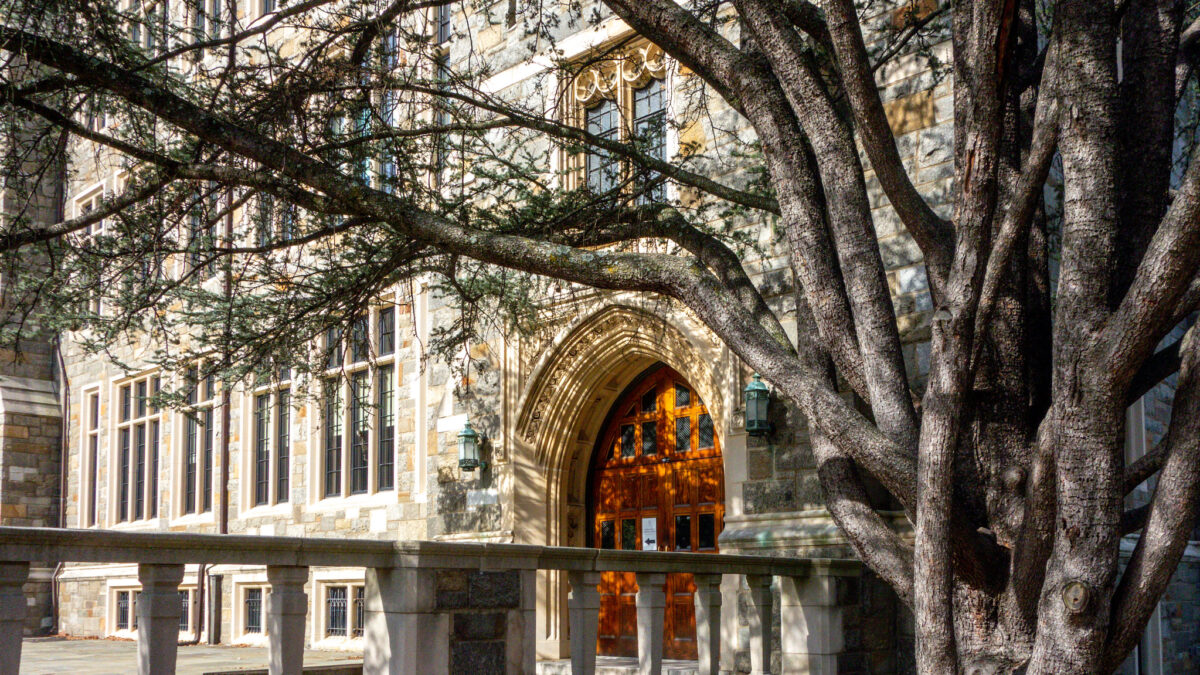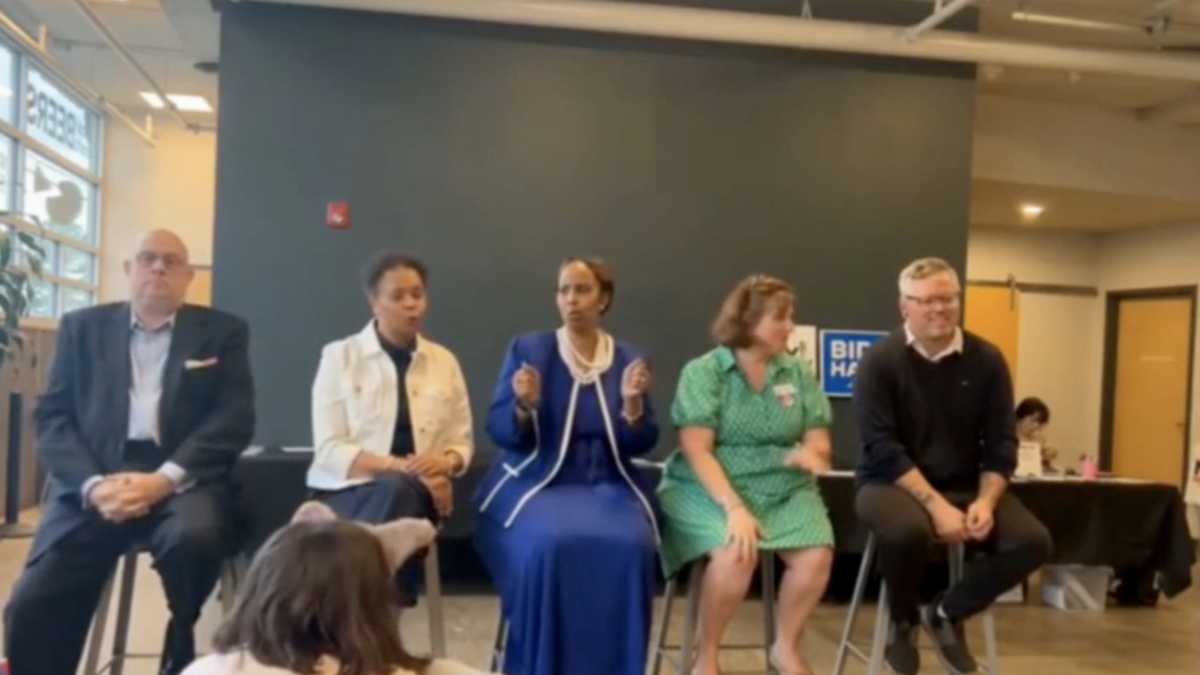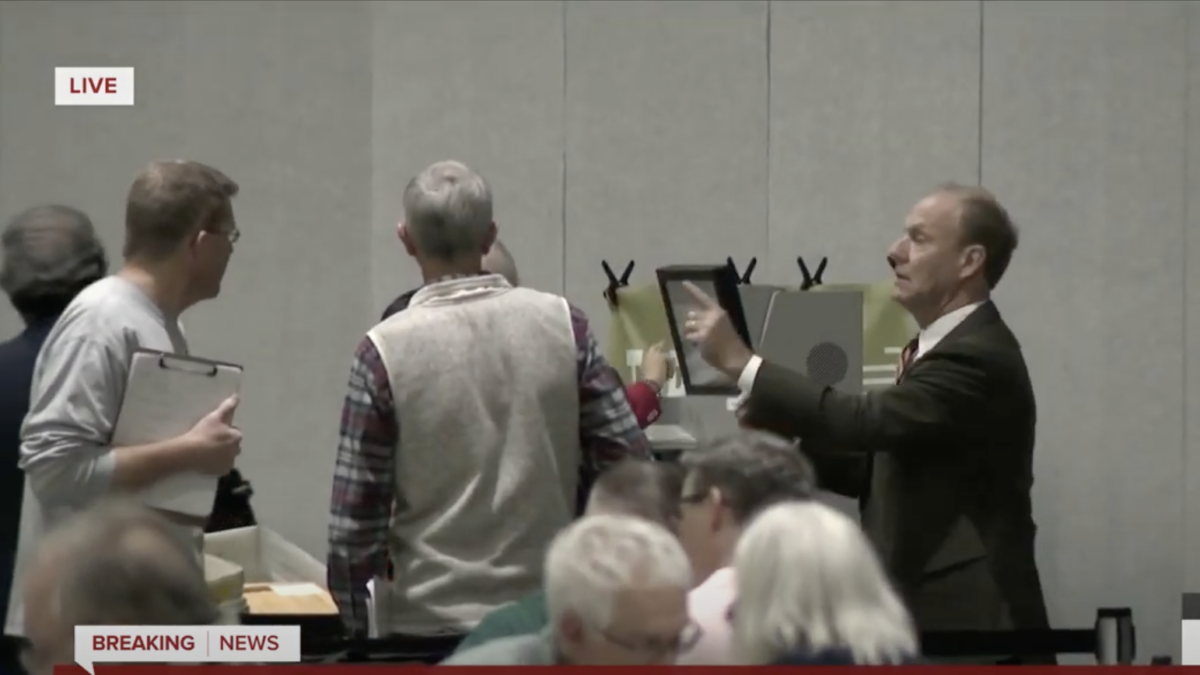
Until now, this year’s stampede of American campus barbarians has met little direct resistance. At “leading” campuses such as Yale, Harvard, the University of Missouri, Claremont McKenna, Ithaca, Wesleyan, and others, campus administrators have cravenly caved to packs of authoritarian rabble-rousers essentially demanding bribe money.
Two-thirds of Americans do not have a college degree yet are forced to subsidize such shameful antics as governments shovel unprecedented billions into “higher” “education” under the laughable pretense of stimulating the economy. They and parents expecting to send their children into this mayhem have looked on these campus hijinks in horror. In videos, fellow students mostly pass by the aggressive protestors or sit mute, in apparent ignorance, terror, or both. Meanwhile, young people tear down statues of Jefferson Davis and Robert E. Lee, and lose their minds when someone writes pedestrian political messages on campus sidewalks.
Yet, thankfully, a small coalition of young folks has found the courage their cowed elders and peers lack. In February, a small coterie of Stanford students arranged a successful petition drive (what a quaint, representative-government kind of idea!), placing their proposal on a campus ballot the student body considers April 7 and 8. It is a simple, elegant idea that directly addresses the roots of campus unrest: restoring a centuries’-old collegiate requirement that students learn something about their cultural heritage.
“Even if you oppose Western values, the only way to critique them meaningfully is to understand them in the first place,” says Harry Elliott, a Stanford sophomore majoring in economics who, as editor of the independent campus paper Stanford Review, has been leading the effort to restore Western civ.
“This year especially Stanford has woken up to the fact that the way people oppose things they dislike has become straight-up absurd,” he notes, in discussing opponents of the measure, who have, like their national fellows in arms, responded with boilerplate demands such as race-based faculty hiring (they want a transgender or minority woman university president), recording and monitoring professors’ speech, and that all students take classes promoting Marxist grievance-mongering. “That a group that calls for diversity in education would call to ban Wells Fargo on campus—I just think it’s absolutely ridiculous and I think the vast majority of students think it’s ludicrous.”
To Be Elite, You Have to Know Something
For their efforts, Elliott and his fellow Western civ defenders have been shut out of “open” events held to foster “constructive dialogue.” Students who signed the petition to put the Western civ question on the ballot have been harassed and notified that their names have been collected in the event they ever “want to run for political office.” The campus elections commissioner (yes, they have one of those) temporarily suspended the petition after a barrage of accusations.
On the phone, Elliott talks fast, almost exuberantly. In fact, it sounds like he’s having fun. He and his little band have been called all sorts of disgusting names and publicly smeared and harassed, but their opponents’ demands are so silly that responding is sport. This comment on a topical Stanford Review article displays an almost humorous directness during our days of political correctness-coated public discourse:
I am shocked that students in grossly irrational groups like this made it into Stanford in the first place! This is one of the worst advertisements for grade inflation and ever-changing institutional admission algorithms that I can think of! As a Japanese American and recent Stanford graduate, I am fed up with these small yet whiny group of prima donnas who have apparently been educated by the coercive art of propaganda directed at those highly susceptible to it. Facts mean little in the way of the agenda or ‘victim’ status.
Hey [Who’s Teaching Us, the anti-Western civ group]: GROW UP! You are wasting your enormous educational opportunity by chasing all of those ‘evil’ ground squirrel holes on the Farm [slang for Stanford]. If you want to make a difference in the world, then go and organize some communities that really need it. Once the rates of crime, violence, teen pregnancy, high school dropouts, illicit drug use and single parent homes decreases from your efforts, you might have a little more credibility behind your whining.
One does wonder how young people who confuse tantrum-throwing with argument managed to get admitted to Stanford in the first place. Apparently it’s easier than one might think. The Stanford Review’s case for the Western civ proposal quotes Stanford Law professor Michael McConnell: “I have taught law students for more than thirty years. In recent years I have noticed that many students have little or no familiarity with the political, intellectual and cultural history that shaped the American legal tradition. I’ve encountered students who have never heard of Hobbes and Locke, do not know the causes of the American Revolution, are unfamiliar with the Lincoln-Douglas debates, haven’t a clue about Progressivism or the New Deal, don’t know what separates Protestants and Catholics, and have only the vaguest sense what race relations were like before the Civil Rights Act of 1964.”
Western Civ Against the Moral and Mental Vacuum
This is a familiar refrain from college professors and K-12 teachers the country over. The truth is, even today’s “best and brightest” are often the degraded best of an emptyheaded, morally vacuous lot. Recall the 2012 cheating scandal at Harvard University, in which the transgressing students blamed difficulty of coursework for their moral failures. The year after, Harvard surveyed its freshmen and found that 42 percent still admitted to cheating on homework.
Besides the moral vacuum among the nation’s youngsters, public knowledge has steadily deteriorated. Over the course of Western civilization, grammar schools have taken their cues from universities. Yet progressives have systematically gutted American curriculum for now approximately a century, prominently with late nineteenth and early twentieth century calls to remove content from public school curriculum. Progressives argued immigrant and working-class children should study more practical, career-oriented subjects. Young folk “of their sort” weren’t suited to the cultural integration of learning how to govern themselves as an American citizen, you see.
The poor were the ones first deprived of a coherent, knowledge-based curriculum, but by now just about everyone is. Like the working-class masses of last century, Stanford students now study not the high arts of cultural leadership or self-government, those pursuits worthy of the phrase “higher education,” but have instead been reduced to highly paid technicians, with 58 percent of Stanford students studying engineering.
“Our alumni innovating in Silicon Valley, making policy in Washington, and investing on Wall Street lack the historical knowledge necessary to grasp their actions’ implications and responsibly shape the future,” the students’ case for Western civ states. Elliott noted that even cog-in-the-machine technicians are human beings part of a society that requires broadly educated citizens for self-government to work. They, too, have souls that need feeding and will in their adult lives make decisions that affect other people, not least of which is voting.
The Lost Arts of Leadership
The inventions of Silicon Valley, where many of these Stanford engineers end up, now greatly affect American society, often just as much as do government regulations that will emanate from the graduates who climb the ranks of bureaucracy. Just consider Apple’s stand for user privacy against the federal government and Twitter’s recent decision to create a speech policing panel.
“Technology is going to have immense political and social ramifications,” Elliott said. “Do any Stanford students have any conception of these ramifications? Probably not. What concerns me is that people will come to a place [in life] where this knowledge is relevant and not be equipped.”
Essentially as long as universities have existed—since medieval days—the few students privileged enough to study at an advanced level have been required to exhaustively digest their cultural inheritance, to temper their growing powers with the ageless wisdom required to wield such power well. Studying history teaches students by example so they can correct rather than repeat old mistakes. Winston Churchill encapsulated the eternal need to study it and all the humanities, the arts that make us human:
Projects undreamed of by past generations will absorb our immediate descendants; forces terrific and devastating will be in their hands; comforts, activities, amenities, pleasures will crowd upon them, but their hearts will ache, their lives will be barren, if they have not a vision above material things. And with the hopes and powers will come dangers out of all proportion to the growth of man’s intellect, to the strength of his character or to the efficacy of his institutions.
Only in recent history, since approximately the last season of campus unrest in the 1960s, have universities so disbanded the humanities that form a core justification for their existence. In 1964, all of the nation’s top 50 colleges and universities had a Western civilization course, and in most of them it was required. In 2010, not a single one of those same universities required the class, and two-thirds of them did not even offer it, according to a 2011 study by the National Association of Scholars.
Rachelle Peterson, NAS’s director of research projects, lists a few of Western civilization’s achievements: “Western civilization was the first to question and to end slavery. Western civilization was the first to liberate women. Western civilization for 2,500 years has made intellectual liberty a fundamental value. Modern science is a Western achievement. Without it, we would have no computers, automobiles, or modern medicine. Western values unshackled millions from oppression.” Hard to shake a stick at that—unless you know nothing about it.
Most Americans, who are part of Western civilization, know nothing of its achievements, making them prey to precisely the sort of grievance-mongering now infecting not just American campuses but our politics and culture. At leading universities, the effects of this mental rot are magnified. How can Stanford and other name-brand graduates go on to lead our society if they dislike it so much they do not want to learn its history? How can they hope to correct Western civilization if they do not know what it is?
The Descent from Reason to Will
In erasing cultural knowledge universities pled racism, classism, and all the boring Marxist rest, but this author suspects a good portion of the real reason for not requiring the society’s future leaders to study the arts that lead to the wise exercise of freedom was, to put it bluntly, laziness. Self-government is hard work. It’s far, far harder than letting others do your thinking and planning for you. And the harder, the more legitimate higher education is, the more limited its reach.
People wanted the fruits of this labor without the labor itself. Americans, as always, were impatient. They wanted the powers of mind, and the growing income associated with these mental powers, without having to put in the years, even generations, of work required to legitimately develop them. So began the long societal march towards substituting credentials for the substance those credentials are supposed to certify, but which has recently quite visibly evaporated. This is a major source of today’s college bubble, which is about to pop.
Thanks in part to our degraded collective intellect, our society is about to pop, too. People who don’t know their history are not inclined to defend it. So we see people in high positions of power, the cultural equivalent of Stanfords, rejecting fundamental Western ideals that took centuries to recognize and protect: freedom of speech, freedom of religion, separation of powers. Hobbes and Locke, the Declaration of Independence, the Magna Carta. The Bill of Rights, the French Revolution, the Lincoln-Douglas debates.
To know these terms is to know the ideas for which they stand. And now even Stanford students do not know these terms. Small wonder, then, that some of them, with counterparts everywhere, seeks to silence opposition through thinly veiled violence and other barbarian-like behavior such as literal iconoclasm. Reviving Western civilization starts with restoring knowledge about its great ideas, achievements, and, yes, failures. The study of Western civilization needs to return to Stanford, absolutely—but also to every village, hamlet, school neighborhood, and home still standing inside it.









